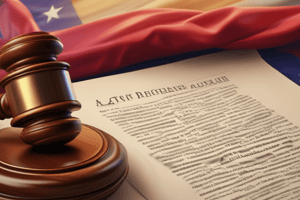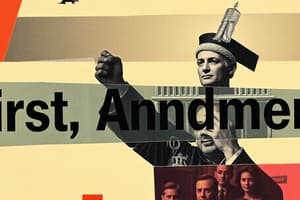Podcast
Questions and Answers
Match the Supreme Court cases with their outcomes regarding student speech rights:
Match the Supreme Court cases with their outcomes regarding student speech rights:
Tinker v.Des Moines = Students have the right to free speech unless it disrupts school operations Bethel School District v.Fraser = Schools can restrict lewd speech Hazelwood School District v.Kuhlmeier = Schools can control school-sponsored speech Mahanoy Area School District v.B.L. = Schools cannot regulate off-campus speech unless it disrupts school
Flashcards are hidden until you start studying
Study Notes
Freedom of Speech in School
- The First Amendment protects free speech from government intrusion, but individuals and organizations can still punish speech.
- Public Schools are technically part of the government, funded by taxpayers and run by state and local school boards, so the First Amendment should apply.
- Founders believed freedom of speech was essential to revolution, communication, formulating plans, and getting the crowd behind them to change the government.
- Seditious libel laws in the colonies made it a crime to criticize the government, regardless of truth.
- The Tinker Test allows students to have free speech rights in school, except if it substantially disrupts school or impinges on the rights of others.
- Tinker v. Des Moines Independent Community School District (1969): Mary Beth Tinker wore a black armband to school to protest the Vietnam War, the school suspended her, the Supreme Court ruled in her favor, saying students do have the right to speak up, and it's a key part of preparing students to become citizens.
- Bethel School District v. Fraser (1986): Matthew Fraser gave a sexually suggestive speech at a school assembly, the Supreme Court ruled in favor of the school, carving out an exception to Tinker for lewd speech.
- Hazelwood School District v. Kuhlmeier (1988): Students published controversial articles on teen pregnancy and divorce in the school newspaper, the principal removed the articles, the Supreme Court ruled in favor of the school, creating a new category of speech called school-sponsored speech, giving schools discretion to prevent and punish speech.
- Morse v. Frederick (2007): Joseph Frederick held a banner that said "Bong Hits 4 Jesus" at a school-sponsored event, the principal confiscated the banner, the Supreme Court ruled in favor of the school, saying schools can punish student speech that promotes illegal drug use.
- Mahanoy Area School District v. B.L. (2021): Brandi Levy posted a snapchat message with a vulgarity related to cheerleading after being cut from the varsity squad, the school punished her for off-campus speech, the Supreme Court ruled in her favor, saying school can't regulate off-campus speech unless it creates a substantial disruption.
Key Takeaways
- Student speech rights are not unlimited and are constantly evolving.
- The Tinker Test is a cornerstone of student free speech rights, but it is not absolute.
- Schools have a legitimate interest in maintaining order and a productive learning environment.
- Social media has blurred the lines between on and off-campus speech.
- Schools are struggling to balance student free speech rights with the need for order and safety.
Brandi Levy's Case
- Brandi Levy was punished by her school for a social media post criticizing the cheerleading squad.
- The ACLU argued that schools should not be able to punish students for off-campus speech because it would limit free speech.
- The Supreme Court ruled in favor of Brandi Levy, finding that her post did not cause substantial disruption at school and was protected by the First Amendment.
- The ruling does not provide clear guidance for future cases involving off-campus speech, especially related to online bullying or harassment.
- The Court acknowledged the difficulties schools face in addressing online behavior but emphasized the importance of protecting student speech even when it is controversial or offensive.
Tinker Decision & Free Speech
- The Supreme Court's decision in Brandi Levy's case echoed the ideals of the Tinker decision, which upheld a student's right to wear black armbands in protest of the Vietnam War.
- The Tinker decision established that student free speech is protected unless it causes a substantial disruption to the school environment.
- The ruling recognized the importance of protecting students' right to express dissent and engage in critical thinking.
- The Court emphasized that schools are responsible for fostering a democratic environment that allows students to express their views and develop into engaged citizens.
Importance of Free Speech
- The cases of Brandi Levy and the Tinker students demonstrate the power of ordinary Americans to shape constitutional rights.
- The ability to express dissenting opinions is crucial for a functioning democracy.
- Young people have a right to engage in public discourse and to express their views even when they are unpopular or controversial.
- Students are encouraged to use their voices and participate in civic life, acknowledging that expressing oneself can be challenging but is essential for active citizenship.
First Amendment & School Speech
- The First Amendment promises free speech, but organizations and individuals can still punish speech.
- Public schools are state funded and governed by local/state school boards, so the First Amendment applies.
- Founders saw free speech crucial for revolution, communication, and attracting support.
- Colonial seditious libel laws made criticizing the government a crime, regardless of accuracy.
- The Tinker Test allows student free speech unless it disrupts learning or infringes on others' rights.
Case Studies
- Tinker V. Des Moines: Student wearing a Vietnam War protest armband won their First Amendment right to school speech.
- Bethel School District V. Fraser: Student's lewd school speech saw the court prioritize school control over free speech.
- Hazelwood School District V. Kuhlmeier: School censored a school newspaper, showing they can control "school-sponsored speech".
- Morse V. Frederick: A student's "Bong Hits 4 Jesus" banner was confiscated, allowing schools to punish illegal drug-related speech.
- Mahanoy Area School District V. B.L.: Student's off-campus, vulgar Snapchat about cheer was protected, unless the school could prove disruption.
Key Takeaways
- Student free speech is not absolute and is still evolving.
- The Tinker Test is a primary guideline for student free speech, but not absolute.
- Maintaining order and learning is a legitimate school interest.
- Social media blurred boundaries between on/off-campus speech.
- Schools balance student free speech with safety & order.
Brandi Levy Case
- Brandi Levy's social media rant criticizing the cheer team was punished by the school.
- The ACLU argued off-campus punishment encroached on free speech.
- The Supreme Court ruled against the school, finding no substantial school disruption.
- This case doesn't universally protect off-campus speech, especially for bullying/harassment.
- The court acknowledged online behavior challenges, but protected student speech even when offensive.
Tinker Decision & Its Influence
- The Brandi Levy ruling mirrors the Tinker decision that protected student protest.
- The Tinker Decision established student free speech as protected unless it disrupts school.
- This encouraged students to dissent and think critically.
- Schools are responsible for promoting democratic environments.
Importance of Free Speech
- The Levy and Tinker cases show everyday people shaping constitutional law.
- Free speech and dissent are vital for a functioning democracy.
- Young people have a right to public discourse, even on controversial topics.
- Students are encouraged to be active citizens, using their voices despite challenges.
Studying That Suits You
Use AI to generate personalized quizzes and flashcards to suit your learning preferences.




